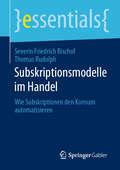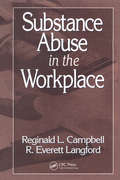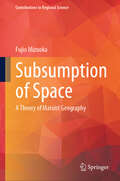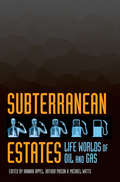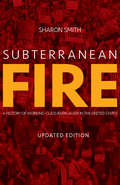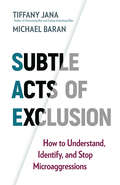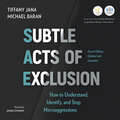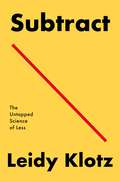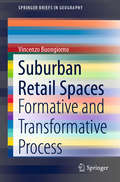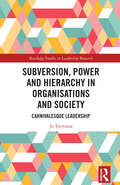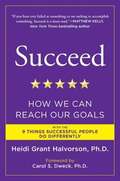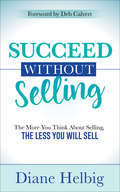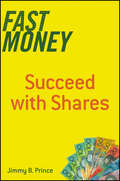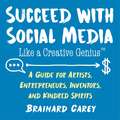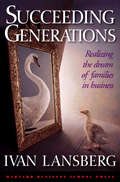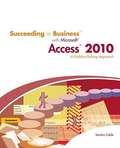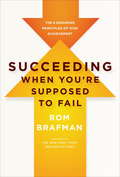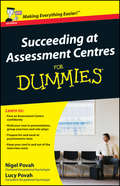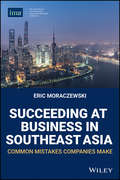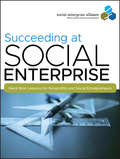- Table View
- List View
Subskriptionsmodelle im Handel: Wie Subskriptionen den Konsum automatisieren (essentials)
by Thomas Rudolph Severin Friedrich BischofKonsumenten wählen im Zuge der Digitalisierung immer öfter Subskriptionen bzw. Abonnements, um ihre Einkäufe zu automatisieren. Im Mittelpunkt des essentials von Severin Friedrich Bischof und Thomas Rudolph stehen Subskriptionen für Konsumgüter, die von Konsumenten in der Vergangenheit in stationären Handelsgeschäften gekauft wurden. Die Autoren beschreiben, welche Arten von Subskriptionen heute eine Rolle spielen und in welchen Branchen diese zukünftig besonders beliebt werden. Sie definieren vier unterschiedliche Subskriptionstypen, die sich hinsichtlich ihres Überraschungs- und Personalisierungsgrades unterscheiden. Das essential hilft, mit passenden Subskriptionsdiensten auf das veränderte Kundenverhalten einzugehen und die Chancen dieses neuen Erlösmodells im Einzelhandel zu nutzen.
Substance Abuse in the Workplace
by Reginald Campbell R. Everett LangfordSubstance Abuse in the Workplace makes a valuable contribution to the national movement to help stem the tide of drug abuse. The book begins with the history of substance abuse, continues with a discussion of how the human body functions normally or under the influence of chemicals, and follows with a toxicological description of the more common ch
Substantive Protection under Investment Treaties
by Jonathan BonnitchaSubstantive Protection under Investment Treaties provides the first systematic analysis of the consequences of the substantive protections that investment treaties provide to foreign investors. It proposes a new framework for identifying and evaluating the costs and benefits of differing levels of investment treaty protection, and uses this framework to evaluate the levels of protection for foreign investors implied by different interpretations of the fair and equitable treatment and indirect expropriation provisions of investment treaties. The author examines the arguments and assumptions of both supporters and critics of investment treaties, seeks to test whether they are coherent and borne out by evidence, and concludes that the 'economic' justifications for investment treaty protections are much weaker than is generally assumed. As such, the 'economic' objectives of investment treaties are not necessarily in tension with other 'non-economic' objectives. These findings have important implications for the drafting and interpretation of investment treaties.
Subsumption of Space: A Theory of Marxist Geography (Contributions to Regional Science)
by Fujio MizuokaThis book takes a Marxist perspective to explore the dynamics of space. By employing dialectical materialist logic, it explains how a heterogeneous spatial configuration emerges through the dialectical process to transcend the contradiction generated by the subsumption (incorporation) of an sich pristine spaces into society, with a particular focus on the context of capitalism. The key concept here is 'subsumption', as presented by Marx in 'The Results of the Immediate Process of Production'. This book is first of its kind that thought-provokingly demonstrates the dialectical logic of the production of space through the application of Marxist logic of subsumption. It succinctly argues that heterogeneous spatial configurations are produced through the society's effort to transcend these contradictions, or the subsumption of space, which transforms pristine space subsumed into a one-point society in formal terms toward a heterogeneous spatial configuration, resulting in an und für sich produced space or space subsumed in real terms. The book also suggests the role of the produced space in potential utilization of space in social struggles. Based on this conceptual framework, this book discusses the built environment, the space embedded in people's minds, and the effects of the capitalist business cycle on space. Ultimately, it presents a compelling case for activists to harness the space produced in their social struggles.
Subterranean Estates: Life Worlds of Oil and Gas
by Michael Watts Hannah Appel Arthur Mason"Oil is a fairy tale, and, like every fairy tale, is a bit of a lie."--Ryzard Kapuscinski, Shah of ShahsThe scale and reach of the global oil and gas industry, valued at several trillions of dollars, is almost impossible to grasp. Despite its vast technical expertise and scientific sophistication, the industry betrays a startling degree of inexactitude and empirical disagreement about foundational questions of quantity, output, and price. As an industry typified by concentrated economic and political power, its operations are obscured by secrecy and security. Perhaps it is not surprising, then, that the social sciences typically approach oil as a metonym--of modernity, money, geopolitics, violence, corruption, curse, ur-commodity--rather than considering the daily life of the industry itself and of the hydrocarbons around which it is built. Instead, Subterranean Estates gathers an interdisciplinary group of scholars and experts to provide a critical topography of the hydrocarbon industry, understood not solely as an assemblage of corporate forms but rather as an expansive and porous network of laborers and technologies, representation and expertise, and the ways of life oil and gas produce at points of extraction, production, marketing, consumption, and combustion. By accounting for oil as empirical and experiential, the contributors begin to demystify a commodity too often given almost demiurgic power. Subterranean Estates shifts critical attention away from an exclusive focus on global oil firms toward often overlooked aspects of the industry, including insurance, finance, law, and the role of consultants and community organizations. Based on ethnographic research from around the world (Equatorial Guinea, Nigeria, Oman, the United States, Ecuador, Chad, the United Kingdom, Kazakhstan, Canada, Iran, and Russia), and featuring a photoessay on the lived experiences of those who inhabit a universe populated by oil rigs, pipelines, and gas flares, this innovative volume provides a new perspective on the material, symbolic, cultural, and social meanings of this multidimensional world. Contributors: Hannah Appel, University of California, Los Angeles; Andrew Barry, University College London; Mona Damluji, Wheaton College; Elizabeth Gelber, Columbia University; Jane I. Guyer, The Johns Hopkins University; Peter Hitchcock, City University of New York; Matt Huber, Syracuse University; Leigh Johnson, University of Zurich; Ed Kashi; Hannah Knox, University of Manchester; Mandana E. Limbert, Queens College and The Graduate Center, City University of New York; Arthur Mason, University of California, Berkeley; Douglas Rogers, Yale University; Suzana Sawyer, University of California, Davis; Rebecca Golden, Women's Institute of Houston; Michael J. Watts, University of California, Berkeley; Sara Wylie, Northeastern University; Saulesh Yessenova, University of Alberta; Anna Zalik, York University
Subterranean Fire: A History of Working-Class Radicalism in the United States
by Sharon Smith“A concise, well-written history of U.S. working-class struggle and radicalism” from the author of Women and Socialism: Class, Race, and Capital (Solidarity).Smith explores how the connection between the U.S. labor movement and the Democratic Party, with its extensive corporate ties, has repeatedly held back working-class struggles. And she closely examines the role of the labor movement in the 2004 presidential election, tracing the shrinking electoral influence of organized labor and the failure of labor-management cooperation, “business unionism,” and reliance on the Democrats to deliver any real gains.“Sharon Smith brings that history to life once again, blasting through the myths of the working class that Trump-era narratives cling to in order to connect us once again to the possibility of building broad solidarity.” —Sarah Jaffe, author of Work Won’t Love You Back“A veteran worker-intellectual brilliantly addresses the crisis of the labor movement, skewering those who believe that renewal can come from the top down, and encouraging those who are fighting to rebuild it from the bottom up.” —Mike Davis, author of Planet of Slums
Subtle Acts of Exclusion: How to Understand, Identify, and Stop Microaggressions
by Tiffany Jana Michael BaranThis practical, accessible, nonjudgmental handbook is the first to help individuals and organizations recognize and prevent microaggressions so that all employees can feel a sense of belonging in their workplace. Our workplaces and society are growing more diverse, but are we supporting inclusive cultures? While overt racism, sexism, ableism, and other forms of discrimination are relatively easy to spot, we cannot neglect the subtler everyday actions that normalize exclusion. Many have heard the term microaggression, but not everyone fully understands what they are or how to recognize them and stop them from happening. In this book, Tiffany Jana and Michael Baran offer a clearer, more accessible term, subtle acts of exclusion, or SAEs, to emphasize the purpose and effects of these actions. After all, people generally aren't trying to be aggressive—usually they're trying to say something nice, learn more about a person, be funny, or build closeness. But whether in the form of exaggerated stereotypes, backhanded compliments, unfounded assumptions, or objectification, SAE are damaging to our coworkers, friends, and acquaintances. Jana and Baran give simple and clear tools to identify and address such acts, offering scripts and action plans for everybody involved: the subject, initiator, and observer. Knowing how to have these conversations in an open-minded, honest way will help us build trust and create stronger workplaces and healthier, happier people and communities.
Subtle Acts of Exclusion: How to Understand, Identify, and Stop Microaggressions
by Tiffany Jana Michael BaranAn expanded edition of the first practical, nonjudgmental handbook for dealing with microaggressions, featuring examples, sample scripts, action plans, a new discussion and activity guide, and up-to-date suggestions for creating a culture of belonging in the workplace.Overt discrimination is relatively easy to spot. But the less obvious but more common actions that make people feel left out or stigmatized in our workplaces, commonly called microaggressions, can be hard to identify and even harder to deal with.The author use a clearer, more accurate term: subtle acts of exclusion (SAE). After all, people generally aren't trying to be aggressive-usually they're trying to say something nice, learn more about a person, or be funny. Bring accused of aggression shuts the conversation down, when you want to open it up. This book features examples, tools, sample scripts, and action plans to help readers prevent subtle acts of aggression from happening, or deal with them when they do. Updated throughout, this second edition features: A greatly expanded chapter on intentional acts of inclusion-actions for creating a sense of belonging. A discussion and activity guide ideal for book clubs and training sessions A new concluding chapter, Hope for HumanityWhether in the form of stereotypes, assumptions, backhanded compliments, or objectification, SAEs are damaging to our coworkers, friends, and acquaintances. This book is your friendly, accessible, non-judgemental guide to creating a welcoming workplace.
Subtract: The Untapped Science of Less
by Leidy KlotzBlending evidence across science and design, Subtract: The Untapped Science of Less offers a revolution in problem-solving: proving why we overlook subtraction, and how we can access its true potentialWe pile on “to-dos” but don’t consider “stop-doings.” We create incentives for good behavior, but don’t get rid of obstacles to it. We collect new-and-improved ideas, but don’t prune the outdated ones. Every day, across challenges big and small, we neglect a basic way to make things better: we don’t subtract.Leidy Klotz’s pioneering research shows why. Whether we’re building Lego models or cities, grilled-cheese sandwiches or strategic plans, our minds tend to add before taking away. Even when we do think of it, subtraction can be harder to pull off because an array of biological, cultural, and economic forces push us towards more. But we have a choice—our blind spot need not go on taking its toll on our cities, our institutions, and our minds. By diagnosing our neglect of subtraction, we can treat it. Subtract will change how you change your world. In these pages you’ll meet subtracting exemplars: design geniuses, Nobel Prize-winners, rock-stars, and everyday heroes, who have subtracted to dismantle racism, advance knowledge, heal the planet, and even tell better jokes. These and more guiding lights show how we can revolutionize not just our day-to-day lives, but our collective legacy. A paradigm shift of a book, Subtract shows us how to find more of the options we’ve been missing—and empowers us to pursue them.
Suburban Retail Spaces: Formative and Transformative Process (SpringerBriefs in Geography)
by Vincenzo BuongiornoThis book derives from observations of the contemporary built environment and its contradictions. The suburban retail spaces, specifically the suburban shopping mall, and the changes caused by them within urban organisms are the object of the investigation synthesized in the volume. The topic is very crucial for the development of the contemporary city. It constitutes at the same time a problem (large commercial structures' spread is 'destroying' traditional commercial urban fabrics) and an opportunity (shopping malls are the most vital parts of the new suburbs and can play the role of community nucleus in urban and suburban areas). Furthermore, the spread of e-commerce forces these structures to functional and spatial transformations that brings also a new relationship with the city.The analytical reading, supplemented by generative and design projections, is carried out by using the conceptual and methodological tools of urban morphology, specifically those of the typological processual approach. From this specific point of view, the suburban shopping mall is read as an organism (a complex system characterized by mutual solidarity and interdependence among component elements) in itself, and as a sub-organisms belonging to the largest territorial organism.The book is intended to offer, to operators, scholars, researchers, professionals and students, a reading and design method, to interpret an important aspect of the contemporary built environment by analyzing the suburban commercial space case. It offers at the same time a model applicable to other specific not-commercial cases, to defining paths for further research and design developments.
Suburban Sweatshops: The Fight for Immigrant Rights
by Jennifer GordonJorge Bonilla is hospitalized with pneumonia from sleeping at the restaurant where he works, unable to afford rent on wages of thirty cents an hour. Domestic worker Yanira Juarez discovers she has labored for six months with no wages at all; her employer lied about establishing a savings account for her. We live in an era of the sweatshop reborn. In 1992 Jennifer Gordon founded the Workplace Project to help immigrant workers in the underground suburban economy of Long Island, New York. In a story of gritty determination and surprising hope, she weaves together Latino immigrant life and legal activism to tell the unexpected tale of how the most vulnerable workers in society came together to demand fair wages, safe working conditions, and respect from employers. Immigrant workers--many undocumented--won a series of remarkable victories, including a raise of thirty percent for day laborers and a domestic workers' bill of rights. In the process, they transformed themselves into effective political participants. Gordon neither ignores the obstacles faced by such grassroots organizations nor underestimates their very real potential for fundamental change. This revelatory work challenges widely held beliefs about the powerlessness of immigrant workers, what a union should be, and what constitutes effective lawyering. It opens up exciting new possibilities for labor organizing, community building, participatory democracy, legal strategies, and social justice.
Subversion, Power and Hierarchy in Organisations and Society: Carnivalesque Leadership (Routledge Studies in Leadership Research)
by Jo TrevennaSubversion, Power and Hierarchy in Organisations and Society: Carnivalesque Leadership explores a leadership strategy that dates back centuries but has become so normalised that it can be invisible as a strategy. Extrapolating Mikhail Bakhtin’s ideas on carnival and its potential for communal freedom and subversive challenge to existing hierarchies, this book identifies components of the carnivalesque, considers why and how they have impact and then maps the application of Carnivalesque Leadership to a series of case studies. Exploratory in nature, these diverse case studies focus on the historic evolution of carnivals in Trinidad and Notting Hill, the safety-valve mechanisms ubiquitous in the education sector, the standardisation of control and release within the corporate sector and the dynamic tension between protest, challenge and fun in Pride events. Readers will benefit from an increased awareness of a strategised Carnivalesque Leadership model and a greater understanding of the potential not only for the safety-valve release of pressure in society and in organisations but also for longer-term change through exposure to alternatives to the official norm.
Subway Energy-Efficient Management (Uncertainty and Operations Research)
by Xiang Li Xin YangThis book provides a comprehensive presentation on energy-efficient management in urban rail transit system via operations research and uncertain optimization methods. It is suitable for researchers, engineers, and students in the fields of transport management. The readers will learn numerous new modeling ideas on reducing tractive energy consumption and improving regenerative energy utilization, and find this work a useful reference.
Succeed
by Halvorson Heidi GrantRead Heidi Grant Halvorson's blogs and other content on the Penguin Community. Just in time for New Year's resolutions, learn how to reach your goals-finally-by overcoming the many hurdles that have defeated you before. Most of us have no idea why we fail to reach our goals. Now Dr. Heidi Grant Halvorson, a rising star in the field of social psychology shows us how to overcome the hurdles that have defeated us before. Dr. Grant Halvorson offers insights-many surprising-that readers can use immediately, including how to: • Set a goal so that you will persist even in the face of adversity • Build willpower, which can be strengthened like a muscle • Avoid the kind of positive thinking that makes people fail The strategies outlined in this book will not only help everyone reach their own goals but will also prove invaluable to parents, teachers, coaches, and employers. Dr. Grant Halvorson shows readers a new approach to problem solving that will change the way they approach their entire lives. Watch a Video .
Succeed Without Selling: The More You Think About Selling, the Less You Will Sell
by Diane HelbigA twenty-first–century sales philosophy that “gets straight to the point about what works, and what doesn’t work in today’s marketplace” (Kevin Kruse, New York Times-bestselling author of 15 SecretsSuccessful People Know About Time Management, Founder and CEO of LeadX).Being successful at sales has nothing to do with “selling.” The best salespeople are the ones who are always curious—not always closing. Succeed Without Selling contains everything a small business owner or sales professional needs to know about what it takes to be successful. From prospecting to discovery to referrals and strategic alliances, it’s all covered. There are even chapters for sales managers, direct sellers, and service providers.Succeed Without Selling also includes resources like sample scripts and proposal templates. Anyone who wants to grow their business will find actionable, easy-to-follow information to help them embrace the value of being more interested in others than in making the sale. Succeed Without Selling changes the way readers look at the sales process forever—and stops them from engaging in behaviors that just don’t work.
Succeed with Shares
by Jimmy B. PrinceDo your finances control you? Frustrate you? Limit you? Well take control of your money today and get more of what you want from life. Bestselling author, Jimmy B. Prince guides you through the ins and out of investing in and profiting from shares. Fast Money: Succeed with Shares is a jargon-free, practical guide that will get you confidently investing in the share market and on the road to financial freedom, fast!
Succeed with Social Media Like a Creative Genius: A Guide for Artists, Entrepreneurs, and Kindred Spirits (Like a Creative Genius)
by Brainard CareyHow to Build a Following, Make Authentic Connections, and Promote Your Work Whether you’re an artist or craftsman selling your work, the owner of a small start-up hoping to network, or just looking for a more meaningful social media experience, this is the book for you. Brainard Carey draws from his experience and interviews with others to show creative people how to make the most of their time on outlets like Twitter, Facebook, and Instagram. Readers will learn how to develop social media campaigns that reflect their personalities, share their unique offerings, and achieve their goals. Chapter topics include: Building a following Maintaining an authentic image Creative ways to share information Using social media to earn a living And much more With chapters focusing on practical how-tos and real-world examples, Succeed with Social Media Like a Creative Genius™ provides readers with both instructive and demonstrative lessons in making the most of their online presence. Everyone can do it with the right tools, and Carey offers an insider's guide to an otherwise daunting process. This book will awaken and nurture the creative genius in everyone.
Succeed: How We Can Reach Our Goals
by Carol S. Dweck Heidi Grant HalvorsonRead Heidi Grant Halvorson's blogs and other content on the Penguin Community. <P> Just in time for New Year's resolutions, learn how to reach your goals-finally-by overcoming the many hurdles that have defeated you before. <P> Most of us have no idea why we fail to reach our goals. Now Dr. Heidi Grant Halvorson, a rising star in the field of social psychology shows us how to overcome the hurdles that have defeated us before. <P> Dr. Grant Halvorson offers insights-many surprising-that readers can use immediately, including how to: <P> • Set a goal so that you will persist even in the face of adversity <P> • Build willpower, which can be strengthened like a muscle <P> • Avoid the kind of positive thinking that makes people fail <P> The strategies outlined in this book will not only help everyone reach their own goals but will also prove invaluable to parents, teachers, coaches, and employers. Dr. Grant Halvorson shows readers a new approach to problem solving that will change the way they approach their entire lives.
Succeed: How We Can Reach Our Goals
by Carol S. Dweck Heidi Grant HalvorsonRead Heidi Grant Halvorson's blogs and other content on the Penguin Community. Just in time for New Year's resolutions, learn how to reach your goals-finally-by overcoming the many hurdles that have defeated you before. Most of us have no idea why we fail to reach our goals. Now Dr. Heidi Grant Halvorson, a rising star in the field of social psychology shows us how to overcome the hurdles that have defeated us before. Dr. Grant Halvorson offers insights-many surprising-that readers can use immediately, including how to: * Set a goal so that you will persist even in the face of adversity * Build willpower, which can be strengthened like a muscle * Avoid the kind of positive thinking that makes people fail The strategies outlined in this book will not only help everyone reach their own goals but will also prove invaluable to parents, teachers, coaches, and employers. Dr. Grant Halvorson shows readers a new approach to problem solving that will change the way they approach their entire lives.Watch a Video
Succeeding Generations: Realizing the Dream of Families in Business
by Ivan LansbergFinding the right successor to a well-loved founder or president is often the most difficult task an organization can face--and the challenge can be even greater for family-run businesses. Succeeding Generations explores leadership transitions in family businesses, offering a clear-eyed assessment of the different options, from direct succession to building partnerships between siblings and cousins. Family-owned companies may dominate the worldwide business landscape, yet surprisingly few are successfully passed down from one generation to the next, and fewer still reach the third generation intact. Author Ivan Lansberg, an organizational psychologist who grew up in a family business, examines the reasons behind this high failure rate and reveals the factors that contribute to long-term success. He offers practical advice on how to mentor successors, how to set up a systematic selectionprocess, and how to make the best use of the board of directors during times of transition. With a wealth of examples from companies in the United States, Europe, and Latin America,Succeeding Generations provides a thoughtful and comprehensive look at the sensitive dynamics of leadership succession in family businesses.
Succeeding In Business With Microsoft Access 2010: A Problem-solving Approach
by Sandra CableSUCCEEDING IN BUSINESS WITH MICROSOFT ACCESS 2010 prepares your students to solve business problems by moving beyond the basic "point and click" skills to think critically about realistic business situations. When students combine software analysis with their own decision making abilities, they are more likely meet any business challenge with success. The Succeeding in Business Series emphasizes problem-solving, critical thinking, and analysis - challenging students to find efficient and effective solutions.
Succeeding When You're Supposed to Fail
by Rom BrafmanIN COUNTLESS STUDIES, PSYCHOLOGISTS HAVE DISCOVERED A SURPRISING FACT: For decades they assumed that people who face adversity--a difficult childhood, career turbulence, sudden bouts of bad luck--will succumb to their circumstances. Yet over and over again they found a significant percentage are able to overcome their life circumstances and achieve spectacular success. How is it that individuals who are not "supposed" to succeed manage to overcome the odds? Are there certain traits that such people have in common? Can the rest of us learn from their success and apply it to our own lives? In Succeeding When You're Supposed to Fail, Rom Brafman, psychologist and coauthor of the bestselling book Sway, set out to answer these questions. In a riveting narrative that interweaves compelling stories from education, the military, and business and a wide range of groundbreaking new research, Brafman identifies the six hidden drivers behind unlikely success. Among them: *The critical importance of the Limelight Effect--our ability to redirect the focus of our lives to the result of our own efforts, as opposed to external forces *The value of a satellite in our lives--the remarkable way in which a consistent ally who accepts us unconditionally while still challenging us to be our best can make a huge difference *The power of temperament--people who are able to tunnel through life's obstacles have a surprisingly mild disposition; they don't allow the bumps in the road to unsettle them By understanding and incorporating these strat-egies in our own lives, Brafman argues, we can all be better prepared to overcome the inevitable obstacles we face, from setbacks at work to chall-enges in our personal lives.
Succeeding at Assessment Centres For Dummies
by Lucy Povah Nigel PovahIt's becoming more common for organisations to use assessment centres as part of their recruitment drive. So if you've recently been invited to one, and you're not sure what to expect or how to excel, then this is the book for you. You'll be guided through how each activity is conducted and how to prepare for each part of the selection process. You'll find expert advice on how to shine in every activity - and get the career you want.Succeeding at Assessment Centres For Dummies covers:Standing Out in Group ExercisesImpressing in Oral PresentationsAchieving in Analysis ExercisesPerforming in Planning and Scheduling ExercisesPerfecting Your Approach to Psychometrics
Succeeding at Business in Southeast Asia: Common Mistakes Companies Make
by Eric MoraczewskiSucceeding at Business in Southeast Asia walks readers through the steps necessary to build and execute a market entry strategy into Southeast Asia, similar to what Eric Moraczewski did with his clients at FDI Strategies. Step by step, readers will learn about the top five pitfalls as well as common areas of concern and mistakes that can be avoided. These can be internal or external issues, country-specific or endemic to the region, but they all are issues Moraczewski solved regularly with clients and other businesses around the globe. Where possible, examples based on his own career experience are used to help reveal the bigger picture and affirm that everyone can, and often times will, make mistakes. Written with humanity and conversational clarity, Moraczewski&’s book delves into critical topics such as relationship-building, power structures, and the role culture plays in economic value and ethical standards. He inspires would-be investors by tapping into universal human behaviors and shows how they can be leveraged to make the right business connections abroad. Additional topics include: Joint ventures Franchising strategy Small businesses breaking into Asia Lessons to bring back from foreign markets
Succeeding at Social Enterprise
by Social Enterprise AllianceFrom the Social Enterprise Alliance, the organization dedicated to building a robust social enterprise field, comes Succeeding at Social Enterprise. This practical guide is filled with the best practices, tools, guidance, models and successful cases for leaders (and future leaders) of social ventures and enterprises. A groundbreaking work, it brings together the knowledge and experience of social enterprise pioneers in the field and some of today's most successful social entrepreneurs to show what it takes to implement and run an effective social venture or organization. Succeeding at Social Enterprise focuses on real life examples, lessons learned and the core competencies that are needed to run a social venture in a nonprofit, highlighting such skills as managing and leading, business planning, marketing and sales, and accounting.Praise for Succeeding at Social Enterprise"This is a must read for anyone starting or growing a social enterprise. The lessons learned offer valuable, practical and real insights from pioneers in the field. The frameworks and tools presented can be implemented immediately to help drive success and expand your social impact."--Kriss Deiglmeier, executive director, Center for Social Innovation, Stanford Graduate School of Business"By successfully weaving together the best thinking and advice from a diverse set of our field's leading experts and practitioners, Succeeding at Social Enterprise will be the new 'must have' handbook for Social Enterprise."--Jed Emerson, www.BlendedValue.org"This is a timely book needed for a movement that's taking off. The leading thinkers and top practitioners in this book make today's pressing issues clear to both the novice and the experienced social entrepreneur."--Kevin Jones, founding principal, Good Capital"Written by the nation's leading experts on starting, building and leading a successful social venture, this book is a profoundly important contribution to the growing body of literature on social entrepreneurship. No other book brings to bear this kind of business experience, practical advice and wisdom on the challenges of creating and sustaining a social enterprise."--David Roll, founder, Lex Mundi Pro Bono Foundation
